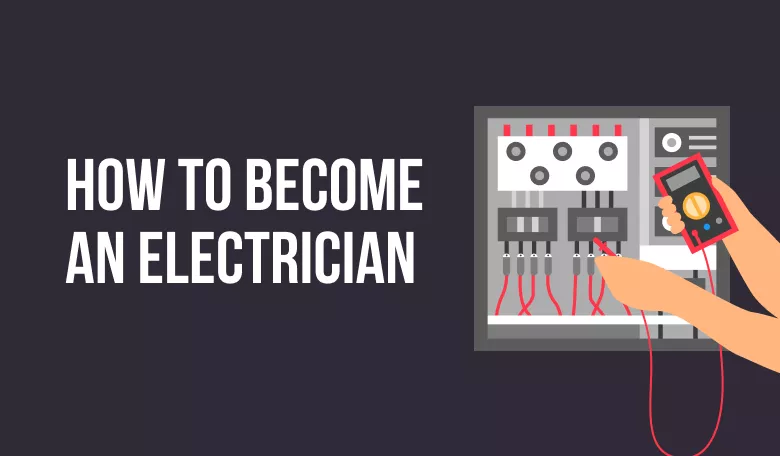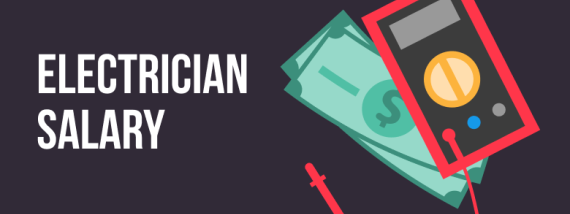How to Become an Electrician

Electricians are an essential part of the construction and maintenance industry. Helping to wire our homes, commercial spaces and institutions, they keep the lights on in buildings across the country.
Because the work they do is so important, electricians are always in demand. According to the US Bureau of Labor Statistics (BLS) electricians earn an average of $60,000. Significantly more than the national average of around $54,000. This makes electrical work a great choice for anyone looking for an interesting, fulfilling and lucrative career.
Becoming an electrician takes time and dedication. In order to get qualified, you’ll need to complete an apprenticeship and gain a good understanding of electrical theory and electrical systems. Once you’ve got a few years of training under your belt, you’ll be able to get your electrician license and get started on your working life.
If you’ve decided an electrician career is right for you, take a look at our step-by-step guide on how to achieve your professional goals.
What Does an Electrician do?
Electricians work with a wide range of electrical systems and electrical components. They work to install, maintain and repair electrical power, communications, lighting and control systems in both residential and commercial buildings. From rewiring old homes to installing new, state-of-the-art tech, electricians work on a large variety of projects.
Types of Electricians
The exact work you’ll do as an electrician will depend on your qualifications and your specialty. While some electricians work largely on residential properties, others specialize in commercial or industrial wiring.
The more qualifications and job experience you have as an electrician, the more complex your work will be. Master electricians are also responsible for training new tradesmen, so teaching may form a larger part of your job as you become more senior.
The main types of electricians are:
- Journeyman electrician
- Master electrician
- Independent electrical contractor
- Residential electrician
- Commercial electrician
- Industrial electrician
A journeyman is the first level of classification. You’ll need to complete a recognized apprenticeship program and pass an exam before you can qualify as a journeyman. Once you hold your journeyman license, you’ll be able to tackle basic electrical wiring and work unsupervised on a range of projects.
After working as a journeyman for around two years, you can apply to become a master electrician. In most states, you need to prove that you have a certain amount of experience and pass an exam before you can get your master electrician license.
Master electricians can lead jobs, offer electrician training to apprentices and direct electrical teams. They also earn more money than journeyman electricians.
Electrical contractors offer electrical services directly to clients. Independent electrical contractors can either work alone or they can hire other electricians to work for them.
Electricians can choose to specialize in residential, commercial or industrial installations or work as general electricians. Each area requires its own specialist skills, so focusing on one aspect of the job can give electricians an advantage.
Steps to Become an Electrician
As long as you have the drive, determination and patience, becoming an electrician is fairly straightforward. First, you’ll need to get a basic education under your belt. Then you can move on to a vocational or trade school before becoming an apprentice and starting on your professional journey.
Earn a High School Diploma or GED
A high school diploma or GED is the foundation of any successful career. If you’re still in high school, make sure you complete your studies and graduate. If you left high school without your diploma, contact your local community college or municipality to find out about the courses on offer.
Attend a Vocational Training or Trading School
There are vocational and trade schools across the country and many offer pre-apprenticeship courses. While this isn’t one of the education requirements of your chosen career path, learning the fundamentals before you start your apprenticeship will give you a head start and help you stand out from the competition.
Register as an Electrician Apprentice
Next, you’ll need to become an apprentice electrician. It’s during your apprenticeship that you’ll learn everything you need to know about control systems, electrical power, transformers, resistors, blueprints and technical diagrams.
You should be able to find a local apprenticeship by looking at online jobs boards or by contacting the United States Department of Labor. Your trade school may also offer electrician apprenticeship opportunities.
Another good way to find an apprenticeship is to go through a union. Contact the Joint Apprenticeship & Training Committees, or JATC. The organization has branches in almost every major city and will be able to contact local employers to find you a placement. If you choose a union apprenticeship, you’ll be required to join the International Brotherhood of Electrical Workers, or IBEW.
If you want to find electrician programs through a non-union route, get in touch with the Independent Electrical Contractors, or IEC, or the Associated Builders and Contractors, Inc (ABC). Both the IEC and the Associated Builders and Contractors, Inc. have locations across the US.
Complete an Apprenticeship
During your apprenticeship, you’ll get a mix of classroom instruction and on the job training. This should give you plenty of opportunities to learn everything you need to know for a career in this highly skilled trade. Your training program should also cover the rules and regulations relating to the industry, including the National Electrical Code.
Once your apprenticeship is complete, you’ll be able to apply to become a fully licensed electrician and start work as a journeyman. Alternatively, you could choose to continue studying to gain specialist skills in certain areas of the job. For example, you could take a course in solar power, electrical engineering or lighting systems. This can make you more employable and help to boost your earnings.
Get Licensed
The licensing process is an essential step in your career path. Almost all states require electricians to secure a license before they start work. To get your license, you’ll need to show that you’ve completed a recognized apprenticeship and prove you’ve got the necessary work experience.
You’ll also need to pass a licensing exam and post an electrical contractor bond. Your electrical contractor bond is there to ensure you follow the rules and regulation set out by your industry’s licensing body and helps to protect the public and paying customers from unscrupulous business practices.
Licensing requirements vary from state to state, so it’s important to check with your state licensing authority to find out exactly what you need to do.
How Long Does It Take to Become an Electrician?
According to the U.S Bureau of Labor Statistics, most electrician apprenticeships last four to five years. These apprenticeships typically involve around 2,000 hours of supervised paid electrical contracting work plus more hours in the classroom learning about the ins and outs of electrical equipment.
Once you’ve completed your apprenticeship, you’ll be able to apply for a journeyman license. This will allow you to work in homes and on building sites under the general supervision of a master electrician. Most electricians work as journeymen for around two years before applying for an independent contractor license or master electrician license of their own.
How Much Does It Cost to Become an Electrician?
The cost of becoming an electrician will depend on the exact career path you take, but in most cases, you’ll be looking at paying between $5,000 and $15,000 before you qualify. These costs are made up of tuition fees, exam fees and license application fees.
While this might seem like a lot of money, the Bureau of Labor Statistics estimates that the top 10% highest earning electricians get more than $99,800 per year in wages. This means you could see a fantastic return on your investment and build a career to be proud of.
- Fast and Secure Application
- Nationwide Coverage
- Approval in Minutes
- Money Back Guarantee
Recommended Articles
- Fast and Secure Application
- Nationwide Coverage
- Approval in Minutes
- Money Back Guarantee
- Image

- Image

- Image

Lance Surety Bond Associates, Inc. is a surety bond agency based out of southeastern Pennsylvania that is able to write all surety bond types in all 50 states. We are dedicated to servicing all of our customers' surety bonding needs throughout the country and guarantee competitive rates, timely responses, and unparalleled customer service.







